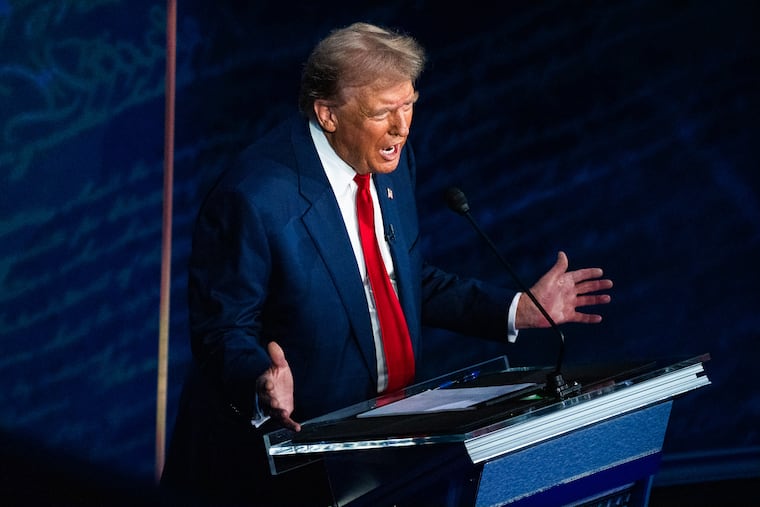Central Park Five sue Donald Trump for ‘extreme and outrageous’ statements he made during Philadelphia presidential debate
Trump falsely said that the five exonerated men "pled guilty" to the assault of a jogger in Central Park in 1989.

The exonerated New York City men known as the “Central Park Five” sued former President Donald Trump in Philadelphia federal court for defamation over a statement that he made during the presidential debate held at the National Constitution Center last month.
During the Sept. 10 debate, Trump repeated the claim that the five men who were falsely accused of an infamous and brutal 1989 assault and rape of a 28-year-old female jogger had “pled guilty.”
“And I said, well if they pled guilty they badly hurt a person, killed a person ultimately,” the Republican presidential nominee said.
While police had obtained taped confessions, the five teens recanted and never entered guilty pleas.
The five were not charged with homicide: The victim was injured severely beaten and was in a coma for 12 days but survived the attack. At least two other people were assaulted that night in the park, but they both lived.
The complaint filed Monday says Trump’s debate remarks were false and defamatory because the men — Yusef Salaam, Raymond Santana, Kevin Richardson, Antron Brown (formerly McCray) and Korey Wise — maintained their innocence throughout their trial and prison sentences.
Trump’s comments were “extreme and outrageous, and it was intended to cause severe emotional distress to plaintiffs,” the complaint states.
In a statement, Trump campaign adviser Steven Cheung said: “This is just another frivolous, election Interference lawsuit, filed by desperate left-wing activists, in an attempt to distract the American people from Kamala Harris’s dangerously liberal agenda and failing campaign.”
The five men, who were between ages 14 and 16 at the time, were accused of the 1989 Central Park assault and rape of a female jogger, Trisha Meili, among other assaults that night.
The teens were separated and interrogated for hours by police, during which four provided written and video statements admitting to their role in the jogger’s assault. But when charged, the teens pleaded not guilty.
The Central Park Five’s case has been used as an example of how police can coerce confessions during interrogations.
Years later, a serial rapist, Matias Reyes, confessed to committing the rape and assault, and in 2002 the convictions of the Black and Hispanic falsely-accused men were vacated. DNA evidence confirmed that Reyes attacked Meili.
In 2014, NYC paid a $41 million settlement to the “Exonerated Five.”
The late 1980s saw an increase in racial tensions in New York, and increases in homicides at a time when a crack epidemic was peaking. Eleven days after the attack, Trump took out full-page ads in the city’s major newspapers demanding that the five teens face the death penalty.
“Bring back the death penalty. Bring back our police,” the ads, signed by Trump, read.
Vice President Kamala Harris mentioned the ads during the Sept. 10 debate.
“Let’s remember, this is the same individual who took out a full-page ad in the New York Times calling for the execution of five young Black and Latino boys who were innocent, the Central Park Five,” Harris said.
Trump responded that Harris was resurfacing a decades-old issue.
“This is the most divisive presidency in the history of our country. There’s never been anything like it. They’re destroying our country,” Trump said. “And they come up with things like what she just said going back many, many years.”
One of the exonerated men attended the September debate in Philadelphia, the lawsuit says, and attempted to ask Trump about his statement afterward in the “spin room,” according to a video provided by attorneys.
“President Trump, I’m Yusef Salaam, one of the ‘Exonerated Five’, how you doing?”
“Oh so you’re on my side,” Trump responded.
“No, no, no I’m not on your side,” Salaam, who is a Democratic member of the New York City Council, says as Trump smiles and walks away.
A federal court can’t order a defendant who loses a defamation lawsuit to apologize or recant their statement, said Shanin Specter, of the Philadelphia law firm Kline and Specter who filed the lawsuit on behalf of the five men.
“What is left is to have a trial in which these men can once again clear their names and obtain money damages against the defendant Mr. Trump,” Specter said.
The attorney expects the lawsuit to move quickly, calling the Philadelphia federal court a “rocket docket” for its speed. Judges usually expect discovery to be completed within six months.